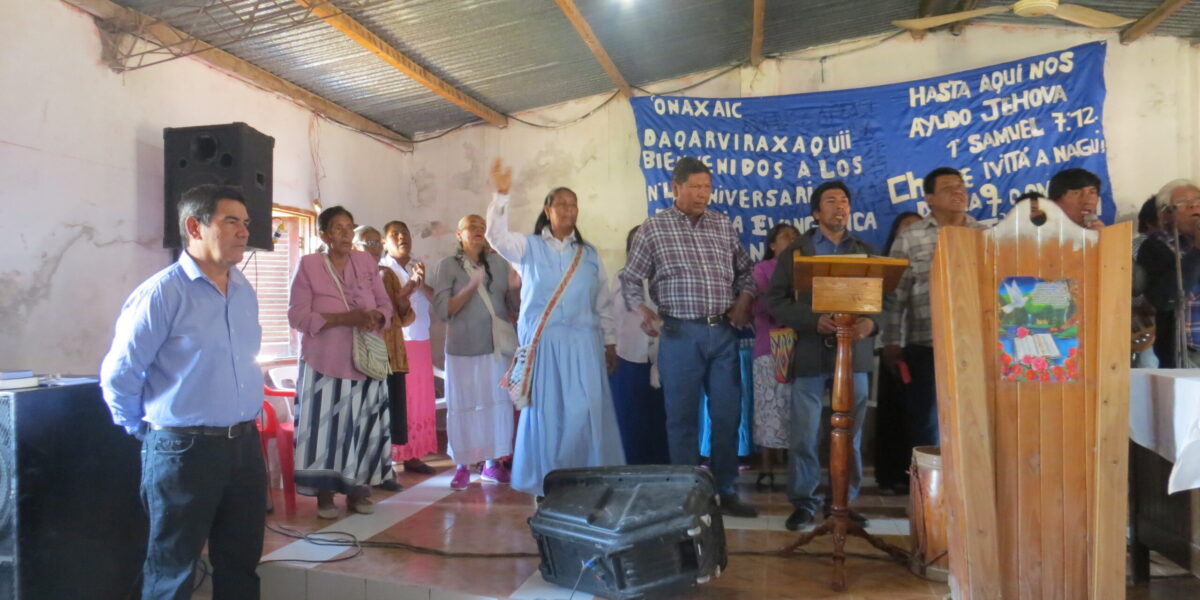Elkhart, Indiana (Mennonite Mission Network) – Under bright blue skies, around 400 people gathered on Saturday, Sept. 16, for a celebrative centennial service near the Buenos Aires port where, 100 years earlier, the first Mennonite missionaries in Latin America stepped off the ship onto Argentine soil. In 1919, the first baptisms took place in the town of Pehuajó, and by the mid-1940s, missionaries felt called to also serve indigenous people 1,000 miles northeast in the Chaco province.
There have been many transitions through the years, both for the Iglesia Evangélica Menonita Argentina (Argentina Mennonite Church, IEMA), and what became known as the Equipo Menonita (Mennonite team) in the Argentine Chaco. Today, Alfonsina and José Oyanguren and their children, Felipe, Emilia, Juan and Tomás, are known as members of the Equipo Menonita, and they work very closely with indigenous church leaders who discern direction together.
Sunday, following the celebration at the port, IEMA hosted a missions gathering where Alfonsina recounted the story of the arrival of the first Mennonite missionaries to the Chaco in 1943. They purchased land, and began preaching, teaching Bible, offering medical and educational services, and preparing people for farm and industrial work.
Although Mennonite work in central Argentina was successful, they experienced very little fruit in the early years of ministry in the northern Chaco. Meanwhile, they observed that indigenous Christians, in their own cultural ways, were evangelizing and forming churches. After about a decade, those early missionaries were encouraged to abandon traditional missionary approaches, focus on translating Scripture into indigenous languages, and accompany the indigenous churches.
Alfonsina reminded those gathered that there are no Mennonite churches in the Chaco. Yet the fruit of the Mennonite work is abundant, through the Scriptures now available in indigenous languages, the existence of the Iglesia Evangélica Unida, the only entirely indigenous denomination in Argentina, and the preservation of languages and culture.
Linda Shelly, director of ministries in Latin America at Mennonite Mission Network, explained that by not planting Mennonite churches, doors have opened to work with teams of indigenous translators from multiple denominations and to start a Bible institute that serves everyone.
In the months of June and July 2017, the entire New Testament was recorded in the Toba Qom language utilizing the Qom Saỹaten (Qom Knowledge) education center. The center houses a radio and recording studio, a library, and serves the community through providing space for a Bible institute as well as a high school degree completion program. The recording was a collaborative project with the Argentine and Bolivian Bible Societies. The process included 33 indigenous readers from eight denominations and 12 communities. The Gospels and book of Acts were recorded in dramatic style while the rest was simply read.
"For many, it [the radio] is the main channel of communication," said José Oyanguren. "People get up in the morning and turn on the radio immediately."
They expect the recording to be appreciated both by elderly people who often have difficulty reading, and also youth who prefer listening on their cell phones and other devices.
Until 1996, all the Equipo Menonita mission workers came from outside of Argentina, though they related closely with Argentines with a similar vision. After two Argentine families and the Oyangurens joined the team, it consisted of seven households: three non-indigenous Argentine families, one German family, and three couples from the United States.
Today, only the Oyanguren family remains from that group. All the other families have moved on to other ministries and life stages.
A partnership was formed by Bragado Mennonite Church in Argentina, Sonnenberg Mennonite Church and Pike Mennonite Church, both in Ohio, and Mennonite Mission Network so that Alfonsina and José could give more time in ministry without needing to rely as much on local jobs for their income.
For the past year, Alfonsina and José’s eldest child, Felipe, has joined the ministry. Felipe has served as an intern with support from Mission Network, and has taken on more responsibilities at the Qom Sayaten education center with the radio station and recording studio.
In addition to his ministry together with his parents, Felipe studies law in a local university, and feels a growing commitment to use his education and gifts to benefit indigenous people.
"I am slowly learning the Qom language," said Felipe "creating relationships with a lot of people young and old, that I already knew, but now I get to know in a different way."







